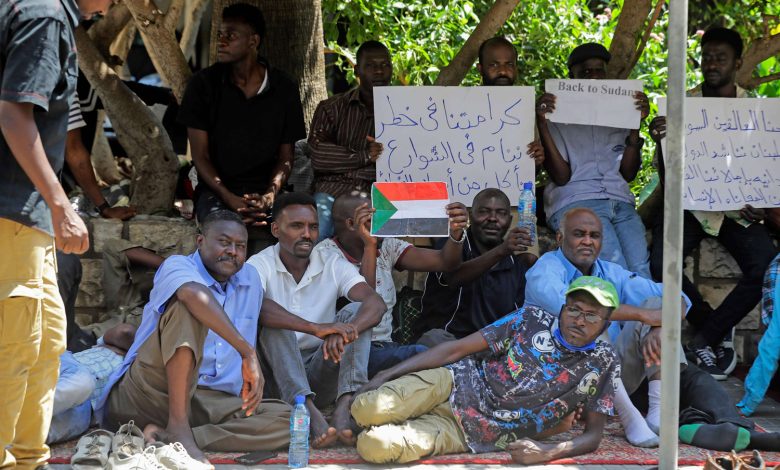Reports
Sudanese in Lebanon: Urgent Calls for Evacuation

Sudan Events – Agencies
On November 10, a group of Sudanese asylum seekers gathered at a café in Beirut, Lebanon. Among them was Sudanese activist Abdel-Baqi Osman, a highly respected figure in the community. Speaking with deep emotion, he described their plight as being trapped between crises in both their homeland, Sudan, and in Lebanon.
The attendees appealed to the UNHCR to relocate Sudanese asylum seekers and refugees registered in Lebanon to Italy, Turkey, or Cyprus until their asylum applications are processed or they are permanently resettled elsewhere.
One of the attendees, Yahya Osman, carried a sign reading, “No to racism, no to social violence, stop killing civilians and children.” Speaking to Al Jazeera, he said, “We know that the UN has the capacity to distribute refugees and asylum seekers to different safe countries, but it is doing nothing.” He added, “We want to go to a place where people are not at war.”
Between Two Wars
The UNHCR reports that 400 Sudanese citizens have sought asylum in Lebanon since the war in Sudan began. Among them is 38-year-old Yahya, a member of a non-Arab ethnic group from Darfur, who fears persecution because of his ethnic identity.
The Rapid Support Forces (RSF) militia has previously targeted non-Arab communities, leading to accusations of ethnic cleansing and genocide.
Fleeing the dangers in Sudan, Yahya initially found safety in Lebanon. However, Israel’s intensified war on Lebanon in late September, prior to a ceasefire, brought new threats.
Yahya and his wife, Nokada, were working on a farm in southern Nabatieh when Israel’s bombing campaign began. Their employer fled, instructing them to stay behind and protect the farm. They endured terrifying nights under bombardment, with no means of escape or shelter.
“At night, I saw Israeli missiles and cluster bombs raining down from the sky,” Yahya recounted. “It was horrifying. I remember how they fragmented into smaller pieces and fell all around us.”
After 10 days, Yahya and his wife decided to walk to Beirut. Their journey on foot lasted several days before they reached the city of Sidon, about 44 kilometers from Beirut, where they caught a ride with other Sudanese and Syrian refugees heading to the capital.
The Sudanese Cultural Club
Established in 1967, the Sudanese Cultural Club in Beirut once served as a community gathering space. Over the years, Sudanese residents celebrated holidays, attended cultural events, and shared meals at the club. In a backroom, Sudanese men would play cards, drink tea, and socialize late into the night.
Following Israel’s invasion in October, the club transformed into a shelter for displaced Sudanese and other migrant workers. Yahya and his wife joined over 100 people, including families, who had taken refuge there.
While the cramped space and limited facilities often caused tensions, the displaced residents cooperated to cook, clean, and support one another. However, Yahya views the club as a temporary solution and supports the community’s call for evacuation to a safer third country while awaiting asylum decisions.
A Protection Gap
Most asylum seekers flee persecution or war to seek refuge in neighboring countries, registering with the nearest UNHCR office. They often wait years to learn whether they will be granted refugee status. Only a few are eventually resettled in a third country to begin a new life, leaving most to live in poverty and face local mistreatment.
According to an International Organization for Migration (IOM) report, approximately 11,500 Sudanese live in Lebanon, with 2,727 registered as refugees or asylum seekers by the UNHCR. Among them, 541 people are urgently requesting evacuation, relying on Osman and other community leaders to amplify their calls.
Osman told Al Jazeera, “The UNHCR claims it does not conduct evacuations, but this is not true. It is a scandal.” He pointed to evacuations from Libya, where over 2,400 asylum seekers and refugees were transferred to Rwanda in 19 evacuation flights between 2019 and 2024.
These evacuations were made possible by a memorandum of understanding between the UNHCR, Libya, the African Union, and Rwanda. Hundreds more were temporarily relocated to Italy through a humanitarian corridor established by civil society groups in collaboration with the UNHCR. The UNHCR’s role was limited to identifying at-risk asylum seekers and facilitating their travel.
A Last Resort
Osman believes that many asylum seekers and refugees in Lebanon might resort to human smugglers if they can afford it. Smugglers often cram vulnerable people onto overcrowded boats bound for Europe. While some have reached Cyprus from Lebanon in recent years, many others have perished at sea.
Most Sudanese asylum seekers, however, lack the financial means to escape. Those who can pay between $2,000 and $3,000 to travel to Turkey via Syria.
“We are worried that the situation here will worsen,” Yahya said. “Since we have no money, we have no choice but to rely on the UNHCR.” Asylum seekers like Yahya pray for protection and hope for a resolution while remaining in Lebanon.



